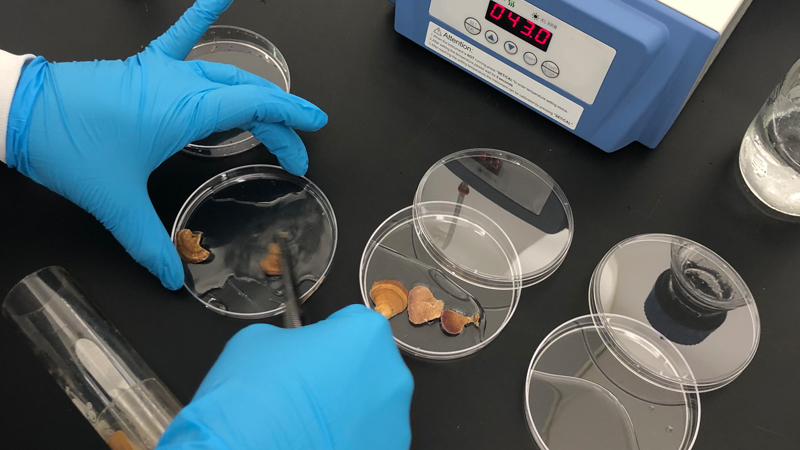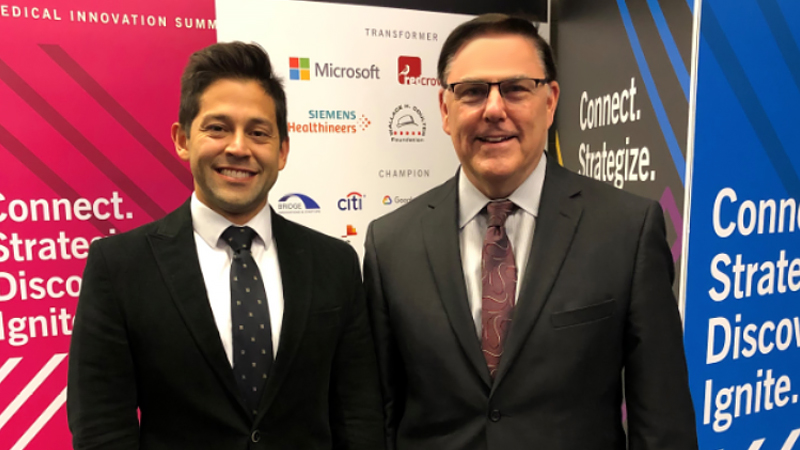Hands-on Environmental Work Preps MS Grad for EPA
Kerry Kuntz ’15 applies the same problem-solving skills she learned at RIT to her current job as a Program Analyst for the United States Environmental Protection Agency (EPA).

“RIT sets their students up for success by providing access to many different fields of work, some of which students at peer institutions may never have exposure to.”
Since her experience with research and hands-on environmental work was minimal before enrolling in the MS environmental science program, Kerry Kuntz '15 took advantage of all the opportunities available in research and job training at RIT. Today, she applies the problem-solving skills she learned at RIT to her job as a Program Analyst for the United States Environmental Protection Agency (EPA).
Kerry attributes her success during the MS program and afterward to her thesis advisor and lab group. Although she was responsible for balancing her coursework, fieldwork, labs, and thesis, her advisor guided her through several setbacks. Dr. Christy Tyler also cultivated a collaborative learning environment with the lab where students assisted and learned from one another through intellectual debate and discussion of scientific literature. Kerry insists that collaborating and learning from others has been a critical component in her career path.
At first, Kerry thought that her path would be working in environmental consulting or research like several of her peers; however, she received advice in her second year, leading her to the EPA's Pathways internship program. She leveraged her experience at RIT and the internship into a full-time position with the federal government.
"RIT puts a strong emphasis on co-ops and career planning and sets its students up for success through hands-on research, coaching, and mentoring, which lends itself to a smooth transition to the workforce."
Kerry’s first job at the EPA was managing research grants for the National Center for Environmental Research in the Office of Research and Development. Because she was involved in research as a student and exposed to many relevant and emerging issues in water quality research, Kerry could apply that experience to her role as a project officer managing extramural research grants.
"Specifically, for my master's thesis, I was conducting research on nutrient cycling in aquatic ecosystems. Since I was already proficient in a related field, I was able to expand my knowledge base and take the lead writing freshwater harmful algal blooms call for research, as well as lead the peer review and selection processes."
Kerry is working at the EPA headquarters in Washington, DC as an analyst for the National Water Program. Her role interfaces between the Office of the Assistant Administrator for Water and the water program offices. She is responsible for liaising between subject matter experts and senior management advising on several lines of business, including budget, planning, and policy.
With a background in wetland ecology and nutrient cycling, Kerry specializes in the wetlands oceans and watersheds portfolio and oversees the budget and planning for programs such as the National Estuary Programs (NEPs), Wetlands Protection and Restoration Program, Impaired Waters, and Nonpoint Source Pollution Programs. She also assists in developing web-based tools and content to analyze, communicate, and engage agency partners and the public in exploring the National Aquatic Resource Survey (NARS). The NARS program is a collaborative program between EPA, states, and tribes designed to assess the quality of the nation's coastal waters, lakes and reservoirs, rivers and streams, and wetlands. The survey provides nationally consistent data on the nation's waters, including lakes, rivers, streams, wetlands, and coastal resources.
Kerry's role requires strong communication skills and a diverse technical skillset. Her day-to-day work includes extraction, analysis, and interpretation of datasets from various agency databases and systems. It's essential to be able to interpret and communicate the results of an inquiry quickly and effectively.
"While it's important to take the lead and take responsibility for your projects, it's also important to use your resources to inform decision making or provide the best product possible."
Working at the EPA headquarters provides a unique opportunity to work at the center of a federal agency. It offers the chance to observe how senior leaders prioritize regulatory work, funding decisions, research direction, and strategic planning. In this role, Kerry has developed a broad understanding of how the organization receives direction from the President, Congress, Office of Management and Budget and partners with federal agencies, external stakeholders, and states and tribes to serve the public. She believes it's a privilege to work at a 50-year-old agency that gives her access to colleagues with an incredible amount of expertise and historical knowledge to share.
For students thinking about what areas of environmental science they might be interested in, Kerry recommends they talk to professionals in the field to learn about different career paths they may want to pursue. She suggests students say yes to small and large opportunities, attend talks, conferences, job fairs, field trips, and get involved in research, whether it's a study abroad program or a co-op experience.
"All these opportunities will help you figure out the path you want to take and connect you with people you can learn from and can help you get to where you are going."








